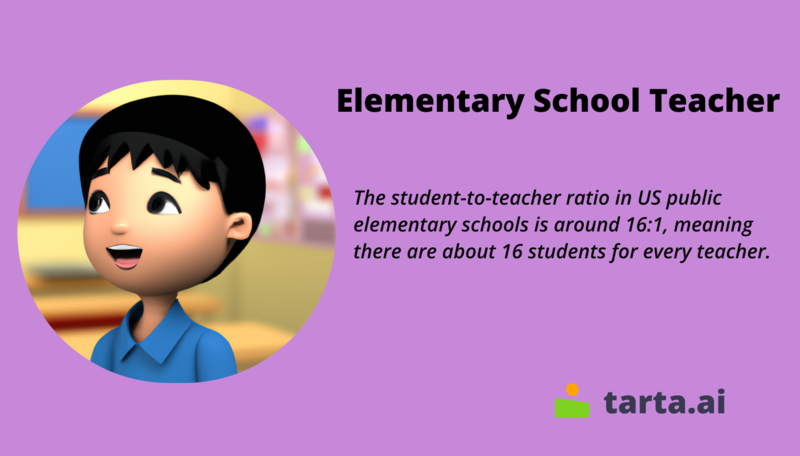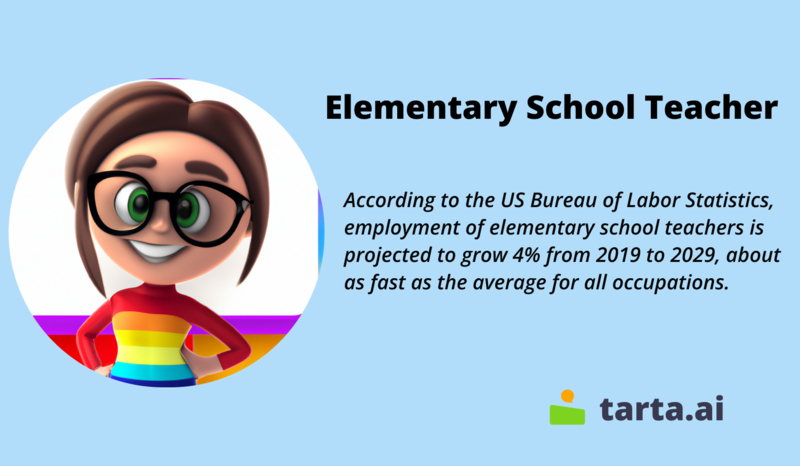A Detailed Guide Into An Elementary School Teacher's Career: Is The Job Worth Taking Up?

The dream begins, most of the time, with a teacher who believes in you, who tugs and pushes and leads you onto the next plateau, sometimes poking you with a sharp stick called truth. – Dan Rather
An elementary school teacher is a professional who is trained to educate and instruct children in the early stages of their academic journey. Typically, elementary school teachers work with students between the ages of five and twelve years old, and they are responsible for teaching a range of subjects including math, language arts, science, social studies, and more. These teachers may work in public or private schools and are typically required to have a bachelor's degree in education, as well as a state teaching license or certification. Elementary school teachers play a crucial role in shaping the academic, social, and emotional development of young children, and they work to create a safe and engaging learning environment that helps students thrive.
Requirements
Becoming an elementary school teacher is a fulfilling and rewarding career that requires a combination of education, experience, and personal qualities. While the specific requirements may vary depending on your location, there are certain criteria that you must meet in order to become a certified teacher. From completing a teacher preparation program to passing state exams and ongoing professional development, the path to becoming an effective teacher is both rigorous and fulfilling. However, beyond meeting the formal requirements, a successful elementary school teacher must have a genuine love for teaching and a desire to help children learn and grow.
So, here are the requirements to become an elementary school teacher may vary depending on the state or country in which you live, but generally, you will need to meet the following criteria:
Education: You will need to earn a bachelor's degree in education or a related field. Some states may also require that you have a certain number of credits in specific subjects, such as math or science
Teacher preparation program: You will need to complete a teacher preparation program, which includes both coursework and supervised classroom experience. These programs are designed to help you develop the skills and knowledge needed to become an effective teacher.
State certification: To teach in a public school, you will need to obtain state certification or licensure. This typically involves passing a series of exams, including a test of basic skills and a subject-specific test.
Background check: You will likely be required to pass a background check, which may include a criminal history check and a fingerprint scan.
Continuing education: To maintain your certification or licensure, you may need to complete ongoing professional development and continuing education courses.
Main Responsibilities and Additional Duties
Elementary school teachers play a crucial role in shaping the future of young children, not just academically but also socially and emotionally. They are responsible for creating a safe and supportive learning environment, delivering engaging lessons, assessing student progress, managing classroom behavior, and communicating with parents. In addition to their primary responsibilities, they may also provide extra support to students who need it, lead extracurricular activities, participate in professional development, and manage administrative tasks. Overall, the job of an elementary school teacher is multifaceted, challenging, and incredibly rewarding. We will explore the main responsibilities and additional duties of an elementary school teacher, as well as the requirements to become one.
The main responsibilities of an elementary school teacher include:
- Planning and delivering lessons: Teachers are responsible for planning and delivering lessons that align with the school curriculum and meet the needs of individual students.
- Assessing student progress: Teachers regularly assess student progress through tests, assignments, and other evaluations to determine how well students are learning and where additional support is needed.
- Managing the classroom: Teachers create a safe and supportive learning environment by setting clear expectations for behavior, managing student behavior, and fostering positive relationships with students.
- Communicating with parents: Teachers communicate regularly with parents to keep them informed of their child's progress, discuss any concerns or issues, and provide advice on how to support their child's learning at home.
- Collaborating with colleagues: Teachers work closely with other teachers, administrators, and support staff to coordinate instruction, share best practices, and ensure that all students receive a high-quality education.
In addition to these main responsibilities, elementary school teachers may also have additional duties, such as:
- Providing extra support: Teachers may work with students who need additional support or who have special needs, providing extra help and accommodations as needed.
- Leading extracurricular activities: Teachers may organize and lead after-school activities such as clubs, sports teams, or academic competitions.
- Participating in professional development: Teachers may attend workshops, conferences, or other professional development opportunities to improve their skills and stay up-to-date on the latest teaching strategies and techniques.
- Managing administrative tasks: Teachers may be responsible for completing paperwork, maintaining student records, and other administrative tasks as needed.
Overall, an elementary school teacher has a critical role in shaping the academic, social, and emotional development of young children, and they work tirelessly to create a positive and supportive learning environment that helps students thrive.

Hard and Soft Skills
As with any profession, elementary school teaching requires a specific set of skills and knowledge to succeed. While a deep understanding of the subject matter is certainly important, being an effective teacher goes beyond just knowing the material. In addition to subject matter expertise, there are a variety of hard and soft skills that are critical for creating a positive and engaging learning environment for young children. From communication and organization to adaptability and empathy, a successful elementary school teacher must possess a combination of these skills to ensure that their students thrive both academically and personally. Let’s have a look at the set of skills that an elementary school teacher may need:
Hard Skills | Soft Skills |
Knowledge of subject matter (e.g., math, reading, science) | Communication skills |
Lesson planning and delivery | Patience |
Classroom management | Empathy |
Student assessment and evaluation | Adaptability |
Technological proficiency (e.g., use of educational software) | Creativity |
Data analysis and reporting | Organizational skills |
Differentiated instruction | Collaborative skills |
Understanding of education laws and regulations | Leadership skills |
It's worth noting that these are just some examples and that the specific hard and soft skills needed may vary depending on the school district, grade level, and subject matter. However, having a combination of strong hard and soft skills is critical for being an effective and successful elementary school teacher.
Payment
The salary of an elementary school teacher in the US can vary depending on several factors, including the state, district, and years of experience. According to the Bureau of Labor Statistics (BLS), the median annual wage for elementary school teachers in the US as of May 2020 was $60,660. However, the lowest 10% earned less than $39,020, while the highest 10% earned more than $99,660. The BLS also reports that the top-paying states for elementary school teachers as of May 2020 were New York, California, Massachusetts, the District of Columbia, and Connecticut, with median salaries ranging from $81,410 to $85,120. It's worth noting that salaries may also vary depending on the type of school, with public school teachers generally earning higher salaries than those in private schools.
There's also a table showing the average annual salaries of elementary school teachers in different states in the US, as reported by the Bureau of Labor Statistics in May 2020:
State | Average Annual Salary |
Alabama | $51,270 |
Alaska | $77,510 |
Arizona | $51,780 |
Arkansas | $50,780 |
California | $85,120 |
Colorado | $63,400 |
Connecticut | $81,410 |
Delaware | $63,510 |
District of Columbia | $84,220 |
Florida | $54,330 |
Georgia | $59,960 |
Hawaii | $59,620 |
Idaho | $55,070 |
Illinois | $68,130 |
Indiana | $56,280 |
Iowa | $57,540 |
Kansas | $54,420 |
Kentucky | $54,720 |
Louisiana | $51,590 |
Maine | $53,740 |
Maryland | $74,280 |
Massachusetts | $82,530 |
Michigan | $66,850 |
Minnesota | $64,930 |
Mississippi | $46,470 |
Missouri | $54,400 |
Montana | $50,630 |
Nebraska | $56,190 |
Nevada | $63,830 |
Factors that Influence the Earnings
When considering a career in education, one important factor to consider is the earning potential of an elementary school teacher. While salary ranges can vary based on a variety of factors, there are several key elements that can influence a teacher's earnings. Understanding these factors is crucial for both aspiring teachers and current teachers who are seeking to maximize their earning potential. There are several factors that can influence the earnings of an elementary school teacher. Here are some of the most significant factors:
- Education and Experience: Typically, teachers with higher levels of education and more years of experience can earn higher salaries.
- Location: The state, city, and district in which a teacher works can greatly impact their salary. Salaries can vary widely based on the cost of living and local funding levels.
- Type of School: Public school teachers generally earn higher salaries than private school teachers.
- Certification and Licensure: Teachers who hold specialized certifications or licenses may be eligible for higher salaries.
- Subject Area: In some cases, teachers who specialize in subjects such as science, math, or special education may earn higher salaries than general classroom teachers.
- Professional Development: Teachers who participate in ongoing professional development and training may be eligible for higher salaries.
- Union Membership: Teachers who are members of a union may have access to better salary and benefits packages.
- Budget Constraints: School districts may have budget constraints that limit their ability to offer competitive salaries.
By considering these factors, aspiring and current elementary school teachers can better understand how various elements can influence their earning potential in the field.

PHOTO: GETTY IMAGES
Ways to Improve Earnings
For many elementary school teachers, finding ways to increase their earnings can be an important consideration. There are several strategies that teachers can use to enhance their earning potential. By taking proactive steps to enhance their skills and qualifications, teachers can improve their overall career prospects while also increasing their earnings. So, here are some pieces of advice that can help you get a bigger salary:
- Pursue Higher Education: Earning a master's degree or additional certifications can help teachers qualify for higher positions within their district.
- Gain More Experience: Teachers who have more years of experience may be eligible for higher salaries, so it is important to continue working in the field.
- Specialize in a Subject Area: Teachers who specialize in high-need subjects, such as science or special education, may be eligible for higher salaries.
- Consider Teaching in High-Need Areas: Teachers who work in rural or urban areas with high levels of poverty may be eligible for higher salaries or loan forgiveness programs.
- Participate in Professional Development: Continuing education and professional development can help teachers gain new skills and knowledge, which may qualify them for higher-paying positions.
- Negotiate for Higher Pay: Teachers can negotiate for higher salaries when accepting a new position or during contract negotiations with their school district.
- Seek Leadership Roles: Teachers who take on leadership roles within their school, such as department chair or curriculum specialist, may be eligible for higher salaries.
By taking steps to improve their education, gain experience, specialize in high-need areas, participate in professional development, negotiate for higher pay, and seek leadership roles, elementary school teachers can increase their earning potential and enhance their overall career prospects.
Additional Benefits
In addition to salary, elementary school teachers may also receive additional benefits at their workplace. These benefits can vary depending on the school district and may include:
- Health Insurance: Many school districts offer health insurance plans to their employees, which can include coverage for medical, dental, and vision expenses.
- Retirement Plans: Teachers may be eligible to participate in a retirement plan, such as a pension or 401(k), which can provide them with long-term financial security.
- Paid Time Off: Teachers may be eligible for paid vacation days, sick leave, or personal days, which can provide them with flexibility and work-life balance.
- Professional Development Opportunities: Many school districts offer professional development opportunities for teachers, which can help them stay up-to-date on the latest teaching practices and technologies.
- Collaborative Work Environment: Teachers may work in collaborative and supportive environments where they can share ideas and receive feedback from colleagues.
- Job Security: Tenured teachers may have job security protections that make it difficult for them to be fired or laid off without cause.
Overall, the additional benefits that elementary school teachers may receive at their workplace can provide them with important financial, professional, and personal support. These benefits can help teachers feel valued and appreciated in their roles, which can ultimately lead to higher job satisfaction and retention rates.
Job Environment
Elementary school teachers work in a variety of job environments, including public and private schools, charter schools, and religious schools. They may work in urban, suburban, or rural settings, and their classrooms may vary in size and resources. Generally, the job environment for elementary school teachers can be challenging but rewarding, as they work to educate and inspire young students.
Job Environment Settings
Setting | Description |
Public Schools | Funded by state and local governments, public schools typically have more resources and support for teachers. However, they may be subject to standardized testing and curriculum requirements. |
Private Schools | Private schools may have more flexibility in curriculum and instruction, but they may also have higher academic expectations and less support for teachers. |
Charter Schools | Charter schools are publicly funded but operate independently from the local school district. They may have more flexibility in curriculum and instruction, but they may also face greater scrutiny and accountability. |
Religious Schools | Religious schools provide instruction within a specific religious tradition and may have unique curriculum requirements. They may also have more parental involvement and support, but they may also face challenges with funding and resources. |
Urban Schools | Urban schools typically serve a more diverse student population, with higher rates of poverty and cultural diversity. Teachers may face challenges in resources, classroom management, and student engagement. |
Suburban Schools | Suburban schools may have more resources and support, but they may also have higher academic expectations and competition among students. |
Rural Schools | Rural schools may have smaller student populations and fewer resources, but they may also have more community support and a greater sense of community among students and teachers. |
Job Environment Tools
Tool | Description |
Classroom Supplies | Elementary school teachers often use a variety of classroom supplies, such as whiteboards, markers, chalk, rulers, pencils, and erasers, to create a learning environment that is engaging and effective. |
Educational Technology | Teachers may use educational technology, such as interactive whiteboards, tablets, and software, to enhance their lessons and engage students. |
Textbooks and Curriculum Materials | Teachers may use textbooks and other curriculum materials, such as workbooks and lesson plans, to structure their lessons and ensure that they are meeting academic standards. |
Assessment Tools | Teachers may use a variety of assessment tools, such as quizzes, tests, and rubrics, to evaluate student learning and provide feedback on progress. |
Communication Tools | Teachers may use a variety of communication tools, such as email, phone, and online platforms, to communicate with students, parents, and colleagues. |
FACT
According to a 2020 survey by the National Education Association, 62% of elementary school teachers reported spending their own money on classroom supplies and materials, with an average spending of $348 per teacher per year.
Work Schedule
Elementary school teachers typically work full-time, which can mean a schedule of around 40 hours per week. However, their work schedule often extends beyond the typical 9-5 workday.
Most elementary school teachers work during school hours, which usually run from around 8 or 9 a.m. to 3 or 4 p.m. However, they may also need to arrive at school early or stay late to prepare lessons, grade papers, and meet with parents or other teachers. They may also need to attend after-school events, such as parent-teacher conferences or extracurricular activities.
During school breaks, such as summer vacation or winter break, elementary school teachers typically have time off. However, they may choose to use this time to attend professional development workshops or to plan lessons for the upcoming school year.
Overall, while elementary school teachers generally have a set schedule during the school year, they may need to be flexible and put in additional hours beyond their scheduled workday to effectively fulfill their duties.
Did you know?
The majority of elementary school teachers in the US are female, with women comprising about 90% of the total elementary school teacher workforce.

PHOTO: GETTY IMAGES
Education
The education requirements to become an elementary school teacher typically include earning at least a bachelor's degree in education or a related field, completing a teacher preparation program, and obtaining state certification or licensure. Here is some more information about each level of education:
Bachelor's degree: A bachelor's degree is typically the minimum education requirement to become an elementary school teacher. This degree program typically takes four years to complete and provides students with a foundation in education theory and practice, as well as subject-specific knowledge in areas such as math, science, and language arts. In addition to completing coursework, students in a bachelor's degree program for education are typically required to complete supervised teaching experience in a classroom setting.
Master's degree: While a master's degree is not always required to become an elementary school teacher, it may be beneficial for career advancement and higher earnings. A master's degree in education typically takes an additional two years of full-time study beyond the bachelor's degree. This degree program focuses on developing advanced teaching skills, as well as educational research and theory. It may also offer opportunities for specialization in areas such as curriculum development or education policy.
FACT
In terms of education, most elementary school teachers in the US have a bachelor's degree or higher, with some states requiring additional certification or licensing.
Professional Associations
Joining a professional association can provide many benefits for elementary school teachers, including opportunities for professional development, networking, and advocacy. Some of the most well-known professional associations for elementary school teachers in the United States include
National Education Association (NEA): The NEA is the largest professional association for educators in the United States, with over 3 million members. The NEA offers a wide range of resources, including professional development opportunities, grants and scholarships, and advocacy for public education.
American Federation of Teachers (AFT): The AFT is another large professional association for educators in the United States, with over 1.7 million members. The AFT provides resources and support for teachers, including professional development, advocacy, and benefits.
Association for Childhood Education International (ACEI): The ACEI is a global professional association for educators who work with children from birth through age 8. The ACEI offers professional development, resources, and advocacy for early childhood education.
National Association for the Education of Young Children (NAEYC): The NAEYC is a professional association for educators who work with children from birth through age 8. The NAEYC offers resources, professional development opportunities, and advocacy for high-quality early childhood education.
Association of American Educators (AAE): The AAE is a professional association for educators that focuses on providing resources and support for individual educators. The AAE offers professional development, advocacy, and member benefits.
By joining a professional association, elementary school teachers can not only enhance their own professional growth but also contribute to the development of their profession as a whole. With the support and resources provided by these associations, teachers can collaborate, learn from each other, and work together towards the common goal of providing the best education possible for their students. Joining a professional association is a meaningful and rewarding way to invest in one's own career and the future of education.

PHOTO: GETTY IMAGES
Licenses and Certifications
The licenses and certifications required for elementary school teachers may vary depending on the state and school district where they are employed. However, here are some common licenses and certifications that may be required:
- State Teaching License: In order to teach in a public school, an elementary school teacher must hold a valid teaching license issued by the state in which they wish to teach. The requirements for obtaining a teaching license may vary by state, but generally include completing a teacher preparation program, passing a content-area exam, and completing a background check.
- Elementary Education Certification: Many states require elementary school teachers to obtain a certification specifically in elementary education. This certification may require additional coursework or testing beyond the general teaching license requirements.
- CPR and First Aid Certification: Some schools may require elementary school teachers to hold current CPR and first aid certification in order to respond to emergency situations.
- Special Education Certification: Some states may require elementary school teachers to hold a certification in special education in order to work with students with disabilities.
- English as a Second Language (ESL) Certification: In schools with large populations of non-native English speakers, elementary school teachers may need to hold an ESL certification in order to effectively teach English language learners.
- Gifted Education Certification: Some states may require elementary school teachers to hold a certification in gifted education in order to work with gifted and talented students.
It is important for aspiring elementary school teachers to research the specific requirements for teaching in their desired state and district to ensure they obtain the necessary licenses and certifications.
Ways of Career Development
There are many ways for elementary school teachers to develop their careers and expand their skill sets. Here are some examples:
- Pursue Advanced Degrees: Many elementary school teachers choose to pursue advanced degrees such as a Master's degree in education, which can provide opportunities for career advancement and higher salaries.
- Attend Professional Development Workshops: Teachers can attend workshops and conferences to learn new teaching methods, curriculum development, and classroom management techniques.
- Join Professional Organizations: Teachers can join professional organizations such as the National Education Association or the Association for Childhood Education International, which offer networking opportunities and access to resources.
- Seek Leadership Roles: Teachers can pursue leadership roles within their schools or districts, such as department chair, curriculum coordinator, or instructional coach.
- Gain Additional Certifications: Teachers can obtain additional certifications in specialized areas such as special education, bilingual education, or STEM education.
The field of elementary education encompasses a wide range of skills and knowledge required for teaching young children. Within this field, there are various subfields and specializations that teachers can pursue to develop their careers and expand their skill sets.
Table with Subfields:
Subfield | Description |
Curriculum Design | Developing and designing curriculum for elementary level |
Classroom | Classroom management, lesson planning, and instruction |
Assessment | Developing and administering assessments |
Special Education | Working with students who have special needs |
Bilingual Education | Teaching in a bilingual setting, often with ESL students |
Table with Specializations:
Specialization | Description |
Reading | Focused on developing reading skills and literacy |
Focused on science, technology, engineering, and mathematics | |
Gifted Education | Focused on teaching gifted and talented students |
English as a Second Language (ESL) | Focused on teaching students who are learning English as a second language |
Early Childhood Education | Focused on teaching students in pre-kindergarten and kindergarten |
Alternative Careers and Similar Jobs
For elementary school teachers who are looking for a change of career or want to explore similar job options, there are a variety of alternative careers and similar jobs to consider. These jobs offer opportunities to transfer skills and experience gained as an elementary school teacher to different areas of education, as well as other industries.
If an elementary school teacher is looking for a change of career or wants to explore similar job options, here are some alternative careers and similar jobs to consider:
- Instructional Coordinators: Instructional coordinators work in schools or districts and help to develop and implement curriculum, train teachers, and assess student progress.
- School Counselors: School counselors work with students on a variety of issues, including academic achievement, personal and social development, and career planning.
- Educational Consultants: Educational consultants work independently or for consulting firms, helping schools or districts to improve teaching and learning outcomes.
- Education Writers: Education writers create written content for education-focused publications, including textbooks, educational software, and online courses.
- Instructional Designers: Instructional designers work to develop and design effective learning experiences and curriculum for a variety of audiences, including students and teachers.
- Education Technology Specialists: Education technology specialists work to implement and manage technology tools and resources in classrooms and schools.
- Private Tutoring: Private tutoring provides individualized instruction to students outside of the traditional classroom setting.
- Corporate Trainers: Corporate trainers design and deliver training programs for employees of businesses and organizations.
- Non-profit Organizations: Non-profit organizations that focus on education may offer a variety of positions, including program coordinators, grant writers, and administrators.
These alternative careers and similar jobs allow for a transfer of skills and experience gained as an elementary school teacher to different areas of education, as well as other industries.
Job Market
The job market and demand for elementary school teachers can vary depending on several factors, including geographic location, population growth, and budgetary constraints in the education sector. However, overall, the job market for elementary school teachers is expected to remain steady, with continued demand for qualified teachers to fill available positions.

This growth is expected to result from continued enrollment increases in elementary schools, particularly in areas with growing populations. Additionally, many teachers are expected to retire in the coming years, creating job openings.
Overall, elementary school teaching is considered a stable career with continued demand for qualified teachers. As with any job, it is important to research the job market in your specific area and to stay current with educational trends and developments to remain competitive in the field.
FACT
According to the National Center for Education Statistics, there were approximately 1.5 million elementary school teachers in the United States during the 2019-2020 school year.
Possibilities of Part-Time and Remote Jobs
There are several possibilities for remote and part-time jobs for elementary school teachers. Some options to consider include:
- Online Teaching: There are several online education platforms that hire part-time and remote teachers to teach courses in various subjects, including elementary education.
- Tutoring: Private tutoring is a flexible and often remote job option for elementary school teachers. Tutoring can be done in person or online.
- Curriculum Development: Many education companies and organizations hire part-time or freelance curriculum developers to create educational content and lesson plans.
- Instructional Design: Instructional designers create and develop educational materials, including online courses and training programs.
- Consulting: Education consulting firms hire part-time and remote consultants to work on projects related to school improvement, teacher training, and curriculum development.
- Editing and Writing: Educational publishers and content providers hire writers and editors to create and edit educational content, including textbooks and digital resources.
- Test Preparation: Test preparation companies hire part-time and remote teachers to develop and teach test preparation courses for standardized tests, including those for elementary school students.
These are just a few of the possibilities for remote and part-time jobs for elementary school teachers. It is important to research specific job opportunities and companies to determine their requirements and qualifications.
Job Satisfaction
The message above discusses the advantages and disadvantages of working as an elementary school teacher. Working as an elementary school teacher can be a rewarding and fulfilling career, as teachers have the opportunity to make a positive impact on the lives of children. However, there are also several challenges associated with the profession, including low pay, long hours, and a stressful work environment. It is important to carefully consider both the positive and negative aspects of the job before pursuing a career in elementary education.
The advantages of working as an elementary school teacher include:
- Making a Difference: As an elementary school teacher, you have the opportunity to make a positive impact on the lives of children, helping them to develop knowledge, skills, and values that will stay with them throughout their lives.
- Job Security: The demand for elementary school teachers remains steady, with job security for those who are qualified and passionate about teaching.
- Flexibility: Many school districts offer flexible work schedules and vacation time, allowing teachers to balance work and personal obligations.
- Benefits: Teachers often receive benefits such as health insurance, retirement plans, and professional development opportunities.
- Professional Development: Teachers have access to professional development opportunities, including conferences, workshops, and continuing education courses.
Disadvantages of working as an elementary school teacher include:
- Low Pay: Elementary school teachers are often paid less than other professions with similar educational requirements and experience.
- Long Hours: Teaching can be a demanding job, requiring long hours both inside and outside the classroom to prepare lessons, grade assignments, and communicate with parents and other school staff.
- Stressful Environment: The demands of teaching, including managing classroom behavior and addressing student needs, can lead to a stressful work environment.
- Limited Autonomy: Teachers are often constrained by curriculum standards, testing requirements, and administrative policies, limiting their ability to be creative and flexible in their teaching methods.
- Emotional Demands: Teaching young children can be emotionally demanding, requiring teachers to be patient, caring, and empathetic.
Overall, the advantages and disadvantages of working as an elementary school teacher will depend on individual circumstances and preferences. It is important to carefully consider both the positive and negative aspects of the job before pursuing a career in elementary education.
Government Programs
Here are several government programs available for elementary school teachers in the United States. These programs aim to support teachers and improve the quality of education for students. Some of the key programs include:
- Teacher Loan Forgiveness Program: This program offers loan forgiveness to teachers who work in low-income schools or educational service agencies for five years.
- Title I: This federal program provides funding to schools with high numbers of low-income students, helping to provide additional resources and support to improve educational outcomes.
- Individuals with Disabilities Education Act (IDEA): This law provides funding to schools to support the education of children with disabilities, ensuring that they receive appropriate education and services.
- No Child Left Behind Act (NCLB): This law requires schools to demonstrate adequate yearly progress in student achievement, providing funding and support to schools to help them meet these goals.
- Race to the Top: This program provides funding to states and districts that are working to improve student outcomes through innovative approaches to teaching and learning.
- Teacher Incentive Fund: This program provides funding to schools and districts to develop and implement performance-based compensation systems for teachers.
- National Science Foundation (NSF): The NSF provides funding to support science, technology, engineering, and math (STEM) education, including professional development for teachers.
These government programs offer a range of benefits to elementary school teachers, including loan forgiveness, additional funding, and support for schools, and professional development opportunities. It is important for teachers to research these programs and determine which ones may be relevant to their needs and circumstances.
- The job outlook for elementary school teachers is generally positive, with steady demand for qualified teachers in most areas.
- Employment of elementary school teachers is projected to grow 4 percent from 2019 to 2029, about as fast as the average for all occupations.
- The demand for elementary school teachers may vary depending on geographic location, with some areas experiencing more demand than others.
- Factors that could influence the demand for elementary school teachers include changes in student enrollment, state and local government budgets, and education policies.
- Job prospects may be best for teachers who are willing to teach in urban or rural areas, who are bilingual or have expertise in a high-need subject area, or who have advanced degrees.
FAQ
What is the job outlook for elementary school teachers?
The job outlook for elementary school teachers is generally positive, with steady demand for qualified teachers in most areas.
How much is the projected employment growth for elementary school teachers?
Employment of elementary school teachers is projected to grow 4 percent from 2019 to 2029, about as fast as the average for all occupations.
What factors could influence the demand for elementary school teachers?
Factors that could influence the demand for elementary school teachers include changes in student enrollment, state and local government budgets, and education policies.
Are job prospects better for elementary school teachers with certain qualifications?
Yes, job prospects may be best for teachers who are willing to teach in urban or rural areas, who are bilingual or have expertise in a high-need subject area, or who have advanced degrees.
Does the demand for elementary school teachers vary by location?
Yes, the demand for elementary school teachers may vary depending on geographic location, with some areas experiencing more demand than others.